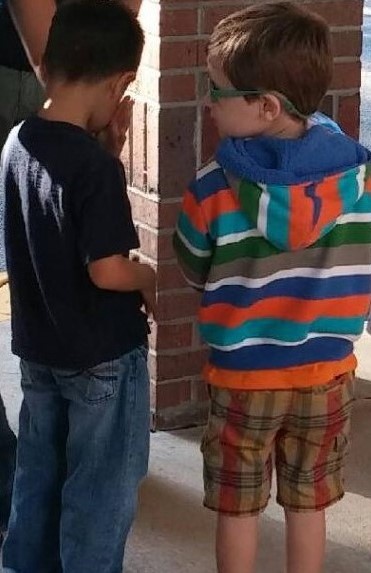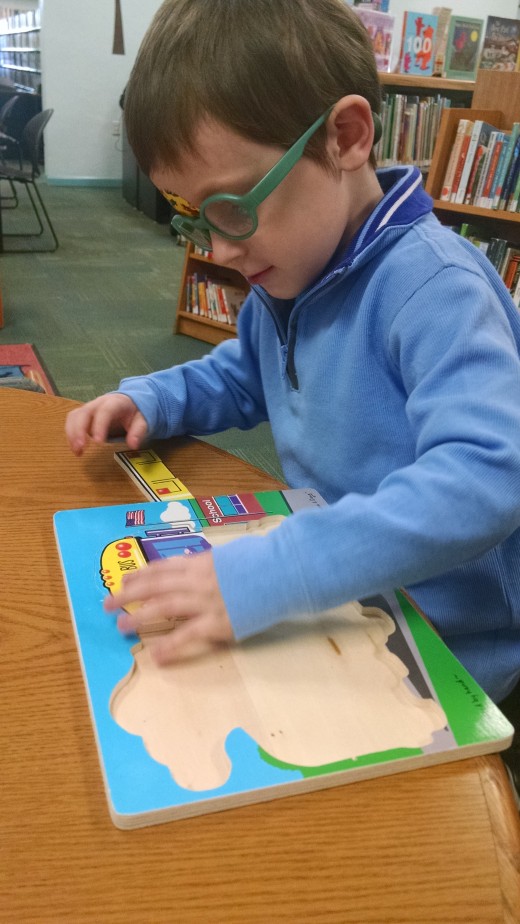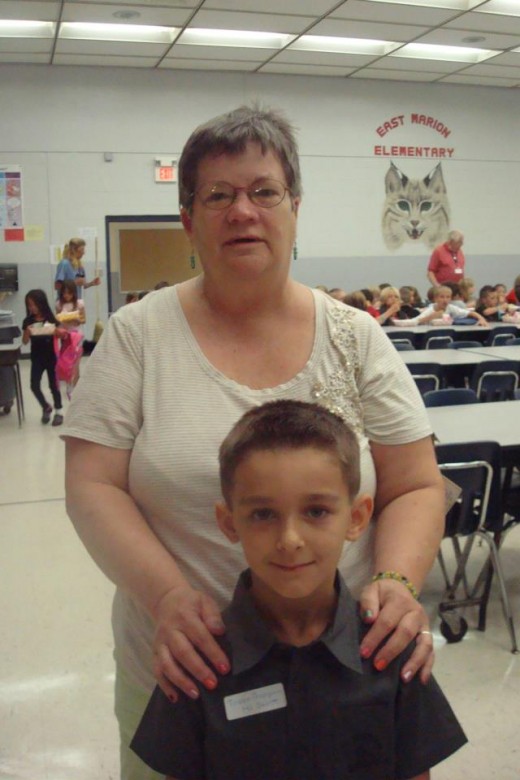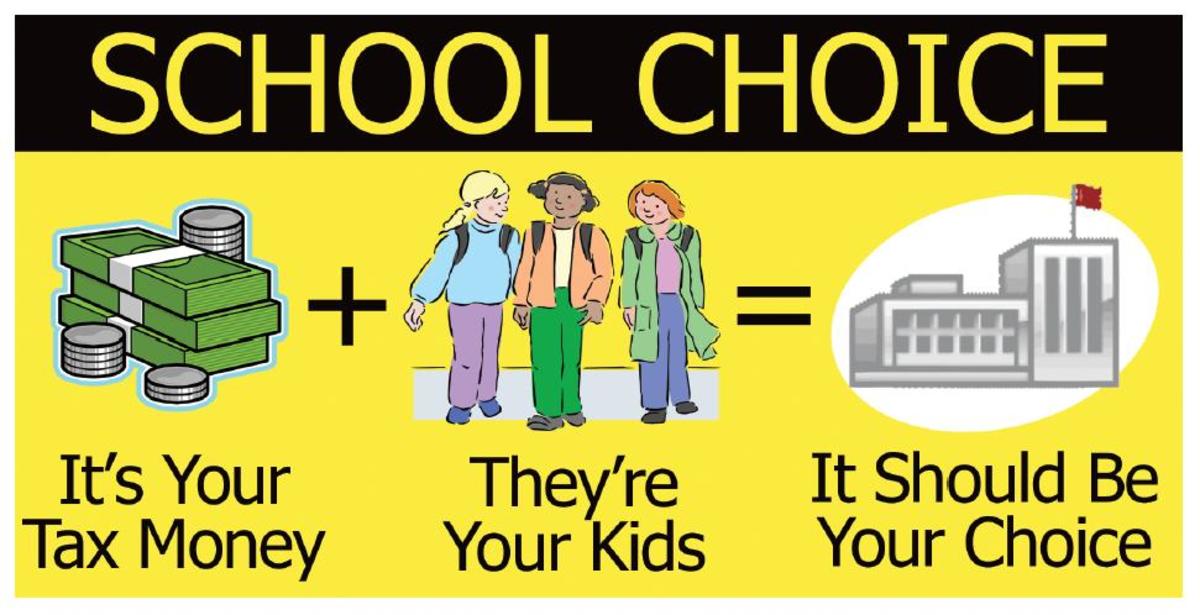Parent Involvement~~ Parents and Teachers Working Together Is the Key to "Fixing" Schools
Learning the Love of Books

Beginning New Friendships....PreKindergarten

My burning passion was to be a teacher. From the time I was old enough to be the school marm to my cousins in the summers, I knew that teaching would be my life's work. To be in the classroom with children who were excited and eager to learn was the idealized vision I had of being a teacher.
When I first began teaching, in 1972, how I taught subject matter was up to me. There was no special program that someone dreamed up that I had to use. I prepared the lessons, decided how they would be carried out, and that was that.
Over the years new program after new program came into the schools. This new one and that new one would insure that every child mastered the subject matter and would be fully ready for the next grade.
During all of those years I always, always believed and I still believe that leaving the parent out of the equation was what was wrong in our schools.
See the Little Red Wagon? It is full of assessments for one year, for one child in kindergarten!!!
Common Core Math is just one more flash in the pan that blew in the window. That is what has happened over the years. A 'new, improved' way to insuring kids are smarter and teachers ARE performing comes along. Someone gets it sold to school districts and soon it sweeps the nation and the program, plan, methodology is the ANSWER.
There is NO magic bullet. Learning takes involvement of student, parent, teacher, administration, and school district.
Fixing What is Wrong
Teachers and parents (caregivers) together will FIX our schools. This is especially true now in 2023. It will not happen overnight but it will happen. With this team working together, the negatives that exist in our schools will no longer exist.And I might add, involving administration in this puzzle is equally as important. Be sure that what you as teachers and parents value are heard by them and acted upon.
There is a disconnect between school and home. What happens in the home after children leave the school has a monumental effect on what happens in the classroom the next day.
What you say about the school and education in front of your children will follow them to the school the next day. Ask about your child's day. Find out al least one thing that they learned. Be certain homework is begun in a timely fashion so that no one is up half the night doing an assignment. Allow time for R & R and exercise.
Little Man Loves to Discover and Learn New Things at the Library

Too Much Emphasis on Testing
The bottom line is the shift has become away from actual teaching to assess, assess, assess. Recently two kindergarten teachers went to a school board meeting in the county that I taught in. They showed those present that kindergarten children are given in excess of 70 assessments each year.
Are you kidding me? When I left teaching due to personal family reasons, three years ago, I was already bogged down in assessments. We not only assessed but them 'remediated' and reassessed.
There was NO time for teaching.....you spent all of your time on preparing for, administering, or following up on testing. It was and is absurd.
Parents should make their voices heard...stop this insanity!!! Contact local, state, and federal agencies to get this excess assessing to cease. Some is good....but it has gotten out of hand.
I have posted to video that shows these teachers discussing over-assessing.
It is normal and to be expected that things that happen will not make you happy every time. Having a tirade in front of your children before you know the facts can be very damaging to the home/school relationship. When you are upset or angry about something your child tells you, contact the teacher and find out the details. If you are still not happy go over the teacher's head to the principal. You will find that is rare that you ever have to go over the teacher's head.
The conundrums...
Having taught in many low socio-economic schools. I know what the realities of life are. . Sometimes education is not the priority in a child's home.
- Sometimes just putting food on the table and clothes on the child's back is what is important to those families.
- Grandparents in their eighties all of a sudden were raising a five year old. They barely had enough energy to take care of themselves and now a precious grandchild was there who had a multitude of problems and needs. Many of these grandparents were in poor health as well.
- Foster parents came to conferences wanting to know what they could do when all the child did was cry all night.
- Single mothers came often with a baby in tow angry at me, angry at the man who left her, angry at the world, overwhelmed.by it all.
- Over the years, a few families told me straight out: " My daddy can't read, I can't read, and by gawd, I don't give a damn if Jonnie can read or not!"
- Husbands and wives came just to hear that their child was doing well. (If they were not, I would have already informed them of that.
You and the teacher are on the same side. You both want your child to succeed. That is the bottom line. Know what the teacher's expectations are. Follow through on them with your child.
Learning about marine life

What you can do...
At Home
| At School
| Beyond the School
|
|---|---|---|
Establish homework time
| Voice concerns to the Principal
| Attend school board meetings
|
Be available to help with homework
| Join PTA or PTO
| Voice concerns to school board members
|
Listen to concerns about school
| Attend School Advisory Meetings
| Contact state legislators about your concerns
|
Encourage exercise and relaxation
| Volunteer
| Vote
|
Limit use of electronic equipment (unless if is for homework)
| ||
Establish bed time
|
One of the extras that may get lost along the way ....My daughter raised hogs all throughout high school

Your voice is far louder than any teacher's voice. What happens in the classroom is happening because we have legislators who have lost sight of what should be happening in schools. Many of them have never been school teachers or school principals. Many of them have no idea what really goes on in the classroom on a day to day basis. Many of them look at test scores, shake their heads, and begin finger pointing.
You, the caregiver, are so powerful.
It was not the need for some new way to teach. It was having parents, caregivers, down at the school house actively involved, at home actively involved, talking with their neighbors and friends about what more they could do.
You as the caregiver of children in your family are key to success for your children and key to change and success of the school. .Y O U are so important in determining what happens at school. Your voice has so much power. This is true at elementary, middle, and high school level.
Often new programs are instituted in school systems because someone told them it was wonderful and would cure all that is wrong in education. Before these new methods or strategies have time to work, you blink, and they are gone and something new is on the way. Millions of dollars are wasted on programs that should be put in to people.
More teachers, more meaningful teacher staff development, fewer students in each class, and PARENT INVOLVEMENT nation wide will fix our schools.
Change will not happen over night but it is the answer.
If we are not part of the solution, then we are part of the problem. it is on us to be proactive. To make it known what we want to happen in our schools and vote out those who do not share our view.
A short but very powerful message about the importance of parent involvement in school
There are NO excuses.
Michael Wynn is a motivational speaker whose message is loud and clear. His dynamic presence will get your attention and hold it hroughout the video that is presented here. I wish that I had had the opportunity to hear him speak up close and personal as this is the type of motivation and inspiration that parents and caregivers need to hear to keep them focused on the importance of education.
This is a powerful, must-see video that gets at the heart of parent involvement in school's today. Take a few minutes to watch and think about what he says.
Assessment is important ....
,Assessment is a part of the whole school experience for children but it should not be what drives the instruction.
Children are being pressured to take assessments that are not developmentally appropriate for their age group.
- They are being asked to wrap their head around concepts that are not appropriate for their stage of development.They are missing steps in the learning process because so much time is being devoted to just administering the test and then even more time is spent on remediation because the teacher did not have time to teach what the child needed to know before the assessment occurred. Think about that. Reteaching has to occur not because the teacher was not teaching well. It happens because there is not time to teach to mastery before the next assessment. Crazy, isn't it?
- Sad, frustrating, but not a dead end street if YOU, the parent/caregiver make your voice heard. Know what is happening in your child's school . Learn about the over assessing that is occurring and then take action. Change will not happen without you becoming personally involved in making change away from over assessment to a reasonable amount of assessing for your child.
- Clearly,we want children to 'stretch', to reach his or her fullest potential, but it needs to occur in a setting that is not driven by assessment, after assessment, after assessment. Over-assessing is counterproductive.
- YOU, as the caregiver, the parent, are not powerless. Contact your legislators...they are listed on the internet and you can find their names at the public library. Tell them you will not vote for over-assessment any longer.
- . Tell them you vote and then do. Vote those out of office who continue to turn a blind eye to what should be happening in classrooms across America.
This was my last year of teaching...This smart, precious child helped make my last few months so memorable .

A parent who got it right
The children shown in the pictures that I mentioned were my students had an amazing Momma and Daddy. Both of them usually came to conferences together. Whatever was suggested to help their children, they tried and if that did not work they were open to more suggestions.
They had busy complex lives like everyone else but they made the time (and still do) for their children. This is what parent involvement is all about.
Class size Matters
When our nation faces difficult economic times, education is often usually an area that is first to lose funding.. Budget shortfalls mean hiring freezes and cutting back. Teachers and assistants sometimes lose their jobs. When someone retires, many times, no one is hired in that individual's place.
The number of students placed in one classroom is not consistent across the nation. In some cases, local school districts decide the number that will be in a classroom. In some cases, class size is determined by the state. Too often those at the state level are so out of touch with what really is happening in a school that they are unable to make informed decisions. Most often, the number of children in a classroom is determined by the dollars and cents available to a school district.
The number of students in a classroom can positively or negatively affect student performance. Keeping class size small in elementary school does create an optimal opportunity for achievement. Make no mistake about it. In the early years, prek through second grade for sure, class size does impact student learning. The basics of a child's education are shaped in those years.
Where do you stand on the issue of class size?
Education is a crucial political issue. Class size becomes more about the political game-playing and less about what makes sense and what is good for children.
Some politicians state that evidence supports his belief that class size does not have the impact on student learning that most people think. They will go on to add that lowering class size was a ploy by teacher's unions to hire more teachers.
Be informed. Know what is being said by those who are seeking public office, agree or disagree. But, do your research first.
Please read this article from the Washington Post that shares with readers seven myths about class size. It evidences the importance of class size
As a teacher of 40 years, I can state with certainty that smaller numbers in the early years makes a huge difference. Lower class size in those primary years allows the teacher to really focus on the individual needs of the child. When the number climbs past 18, the time with each child is diminished due to sheer numbers.
It is important enough to say more than once....
- Establish a homework time and place for your child.
- Be available to help with homework-- to help, clarify, explain.
- If you are unclear about homework policies or a particular assignment, call the teacher
- For early elementary children--Take items out of the backpack or bag your child brings home from school.
- Review papers; keep at home the ones that are correctly completed; have your child correct the incorrect ones and return to the teacher.
- Establish a routine for snacks and playtime so there is no confusion.
- Establish a routine for bedtime from bathing to reading a story.
- Send your child to school each day with a positive attitude.
- STAY IN THE LOOP. Volunteering is a great way to do so.
When you volunteer at school, it sends a loud message to your child.
- Volunteering at your child's school is a way to send a loud message to your child. It says loudly and clearly that school is an important place to be. The message is sent even more loudly than if you say it.
As a volunteer you may:
- help a child learn sight words
- read to a child
- listen to a child read
- cut out items for a bulletin board
- help in the media center
- help with special events such as carnivals, Secret Santa Shops, recognition days for students
State the area in which you wish to offer your assistance.
- Joining the PTO or PTA and the School Advisory Team gives you another way to voice concerns and to help improve the school that your child attends. Rather than being on the outside looking in wondering what is happening at the school, by joining and participating you will play a vital role at the school.
More important lessons that are learned....
Many people do not realize how much is taught in school in the primary grades that is not academic. A few of them are: social skills, every day survival skills such as how to tie a shoe, how to button pants, or shirts, how to hold a pencil, how to cut are all taught on a daily basis. This does not include the time spent comforting and reassuring children who lose a loved one or a beloved pet; how to treat others; what to do if someone is bullying; good manners, to name just a few. This takes time. The more children there are in a class, the less time there is to give to each child.
Whether your child can have music, physical education (PE), or art at school is very often a matter of economics. These three subjects are often areas in which children who have difficulty with academic subjects find their niche.
Children may find they can excel in art or in music. A natural affinity for one of these areas will awaken the creativity that has been waiting to be discovered. This creative outlet is often the spark that a child needs to boost confidence and help them to feel successful.
PE is many times the highlight of a child's day. Getting to run and compete and play is another way to develop the total child. As with music and art, PE may be one area in your child's day that success comes easy.
You know your child and your child's needs. Be certain that your school has these special area classes music, PE, and art. Demand the best for your children.
Make your voice heard. You will make a difference if you do.
Together teachers and caregivers can turn our educational system around
As the caregiver, you have a voice that is powerful and can get things done.
Make it known that you care about:
- assessment
- class size
- special area classes---music, PE, and art.
You are taxpayers. Remind your legislators of that fact.
You are a truly a powerful part of this total puzzle. Removing the mystery and knowing what is happening in your school system and particularly in your child's school will give you the knowledge you need to voice your concerns. Use it.
Work with teachers. Get to know them. Let them know how much you care. With you and the teacher working together your children will be successful.
Demand the best for your children.
Make your voice heard. You will make a difference if you do.
YOU are the power behind change for your children.
Reflection
Obviously these are my opinions.
- Curing, fixing, and repairing education is not a simple easy process. But I do believe that if we as parents and teachers focus on the education of our children in a united way that it will begin to turn around what so many see as an educational system that is broken.
- I often wonder how I grew up to be able to function in our society if the educational system I am a product of was so bad. When I went through school, there was no technology, there were no special programs that would FIX our kids and make them smarter, there was no Dog and Pony Show.
- There was the child, the parent, the teacher, and the books. That was it. And we had a job to do and we really did not have much choice about whether we did it. School was our job, our only job. O, there were paper routes and things and some of us were allowed to stay home to harvest foods when crops came in, but the overall focus was that education was fundamental and was the foundation for our future.
- Today the same elements are present: the child, the parent, the books, and a huge plus...the internet and all of the other technological advances that can bring education to life for each child. Teachers can display pages from the internet on smart boards for all children to see and discuss. There is never a reason for a child at any level to be bored. There are just no excuses for kids not to be actively involved and engaged, for parents not to be involved, and for teachers not to make learning an exciting experience every day....That is, teachers can make it exciting every day if they are not funneling information for the next assessment rather than leading children on the grand adventure to discover, explore, and really learn.
- I do know there are extenuating circumstances that sometimes keep parents from being as involved as they would like I get that. During my career, I worked diligently with parents and caregivers who faced seemingly insurmountable problems but who still wanted their child to learn. There were some caregivers that I drove to social service agencies when they had no other way to get there. There were caregivers that I would pick up in the morning and they would throw their duffle bag containing all of the family's worldly goods into my trunk. They were on the street for the day until it became dark and they could return to their shelter.
- Having been homeless I know how daunting and humbling it is. I know how vulnerable I felt wondering how I would walk eight miles to the store yet another time. But, you do it.
- And that is what many do who face great challenges. They get up and face the day. And try to make a difference for their children.
- YOU will bring about change with your efforts.
© 2013 Patricia Scott








